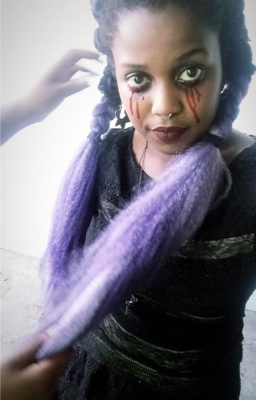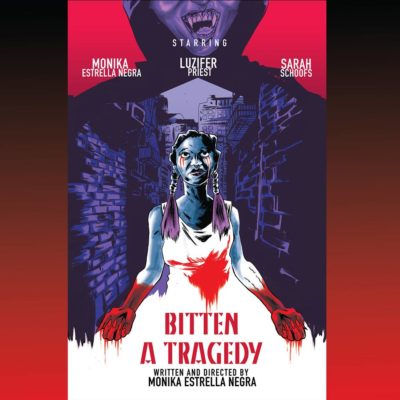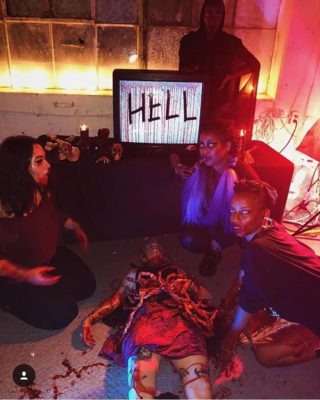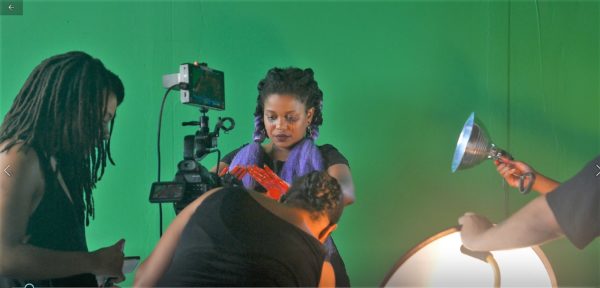 Name: Monika Estrella Negra
Name: Monika Estrella Negra
Age: 31
Birth Place: Houston,TX
Sexuality: Bisexual
Notable films: FLESH (2016), They Will Know You By Your Fruit (2017)
When did you know you were queer? When did you come out?
Monika Estrella Negra: I knew I was queer when I was young. I developed crushes on all of my girl friends – only to be rejected and bullied for it. I never felt that I was different, but I was definitely a tomboy.
Unfortunately, my coming out story isn’t glamourous. I was discovered making out with a girlfriend in a car and a family member saw me. They gave me the ultimatum of telling the family or they would do it for me. I refused and the truth came to light. I was kicked out of my home and was left to my own devices (I was around 18 when this happened). I was not prepared to deal with the world on my own, but I made it work. It was also my entry way into the punk universe, which ultimately changed my life for the better.
How did you get into filmmaking?
MEN: My mother bought me my first mini DV camcorder for good grades when I was 15. Growing up, I used film to escape some of the harsher realities of growing up post-crack epidemic within the inner city. While my child hood wasn’t the best, it wasn’t awful, but having to explore the world as a weird, Black, queer goth kid made me a recluse. Film (writing and reading) became my best friend. I had quite the obsession for filming in school and making little films with my X-Men action figures – out of sheer boredom, of course!
My great-aunt helped me develop a healthy taste for all things horror and science fiction: Twilight Zone, Dark Shadows, Terminator – she had excellent taste. This fed a desire to one day create my own narratives, ones that I didn’t see in the films that I consumed.
When I set out to create FLESH, I had no idea. I had been organizing a show called ‘Black and Brown Punk Show’ in Chicago for five years, had bounced around from house to house and city to city. I felt like I had to take an initiative towards other dreams I held close to my heart. I did attend college before I moved to Chicago, but it wasn’t for film. So I had to learn how to create a film for myself. Luckily, living in the technological age helped me piece it together slowly. All I used was desire for telling a story – particularly mine.

What is it about horror that attracts you?
MEN: To me, horror is the definitive genre that has no rules. That being said, it has also been a genre that has lacked any characters that I could personally identify with. There have been many films that have held the “no wave” torch [a rejection of commercial works], and I aspire to continue that tradition – by creating my own.
Also, horror is a good medium to discuss the depravity of white supremacy in this country, and how it can affect someone’s psyche in the worst way.
You’ve previously mentioned the films of Dario Argento, Attack The Block and Danny Boyle’s 28 Days Later as influential films. What other films (queer or not) have made a significant impact on you and your work? In what way?
MEN: Surprisingly, a lot of directors I love are not horror filmmakers (at least, they never identified aesthetically as such, but did touch upon horrifying topics at times).
Agnes Varda is one of my favorite filmmakers because she always had a penchant for telling the stories of the everyday person. Her use of her own political preferences with her stories also gave me the strength to create unapologetic narratives of my own. Julie Dash (Daughters of the Dust) gave me the inspiration to tell the stories of my ancestors and my own ethnic identity with beauty and grace. Maya Deren taught me how to make an audience *feel* the story by using a collage of sounds, visuals and off beat sequences. John Waters gave me the idea to be as absurd and filthy as possible. Marlon Riggs unveiled intersectionality to me (Ethnic Notions, Black is Black Ain’t) and reassured me that it is possible to explore sexuality and race in a single film. George A. Romero taught me that it is possible to infuse sociological critique and lots of gore without a hint of camp.
I don’t know – I have so many influences! It’s very hard for me to gush about only a few.
How progressive or welcoming is the industry for queer creators right now?
MEN: I think there is still significant stigma against Black queer creators at the moment. Specifically in regards to Black women – I think Dee Rees is still highly underrated. There is still an identity hierarchy that blocks people from getting the resources needed.
Yes, there are notable celebrities that are making strides (Janelle Monae, Lena Waithe). BUT I still have an issue with LGBTQA pride operating without critique of the capitalist hellscape that makes us invisible in popular culture, outside of the heteronormative idea of what is acceptable or respectability politics. In the queer world that I inhabit, we intend to burn down that world – and bring forth an identity that is free of traditionalist bullshit. That is why so many of us are still ripped off by corporations who attempt to appropriate our language, our fashions, our politics. It is far easier to sell an image versus promote the ideology behind the creation of the world. Queer liberation is in no way tied to any type of capitalist exploitation and that is a very dangerous investment for a lot to step into.
 You’ve talked openly about how important it is for queer and trans people of colour to be represented in the horror genre (it’s part of the reason why you named your Collective Audre’s Revenge). Why it this still so important and how does it inform your storytelling process?
You’ve talked openly about how important it is for queer and trans people of colour to be represented in the horror genre (it’s part of the reason why you named your Collective Audre’s Revenge). Why it this still so important and how does it inform your storytelling process?
MEN: It’s not so much about representation anymore since more corporations are finding a way to profit off of LGBTQA communities. My focus is on who controls the narrative, and who is getting the work. It’s so easy to hire a queer or trans person of color to star in a film, but who wrote it? How many of the crew are from the same community?
I am against any type of voyeurism when it comes to story telling because it is a reflection of the many privileges in society. I know so many talented make-up artists, dancers, screen writers, and musicians who are literally working for minimum wage in a field that is not reflective of their talent. What does it say about an arts world where only the super rich, (majority) white, cisgender, heterosexual people have nepotism within the industry? It leaves a bunch of culture-starved vultures who prey on those who have real stories to tell.
If people want to get the real grit, the true value of the stories being brought to life – HIRE PEOPLE WHO LIVE THAT LIFE. It’s really that simple. Also, especially within horror, I think it is high time for queer and trans people to carry stories that are reflective of our own innate horrors. I am not sure if mainstream audiences would be able to handle it, however, considering how the state of this country results in a lot of the horrors that we face. People don’t like to face the truth. I think Audre would agree with me.
Do you subscribe to queer readings of your films?
MEN: I try not to subscribe to what anyone thinks about my films. If it’s what came from my heart, then it is what it is. Everyone else can think whatever they want.
Have you interacted with many queer horror fans of your work? What has that experience been like?
MEN: The majority of my fans are part of the queer community that I inhabit. Some of them I met while I was organizing in Chicago and some are just rad people that I have met through my many travels. I have been very blessed to have found a dream circle!
I admittedly did not know that there were as many queer kids that love horror as much as I do. For a lot of us, we found comfort in a world that was horrifying in fiction, while so many of us experienced hellish experiences in our life.

You’ve successfully fundraised for several shorts, including Flesh, They Will Know You By Your Fruit and now Bitten, a Tragedy. Can you provide a status update on Bitten and talk about what’s next for you?
MEN: Bitten, a Tragedy resumes filming this summer and then it’s a wrap! I am hoping to have it out into the world by Halloween, or maybe sooner. I am sincerely excited to finish filming and sharing this story that I have had in my head for almost two years.
Once it is finished I plan on writing more stories and obtaining resources for a studio where myself and other budding filmmakers can create. The future is definitely uncertain, but I am confident that creating more narratives is definitely in store.
Follow Monika on social media: